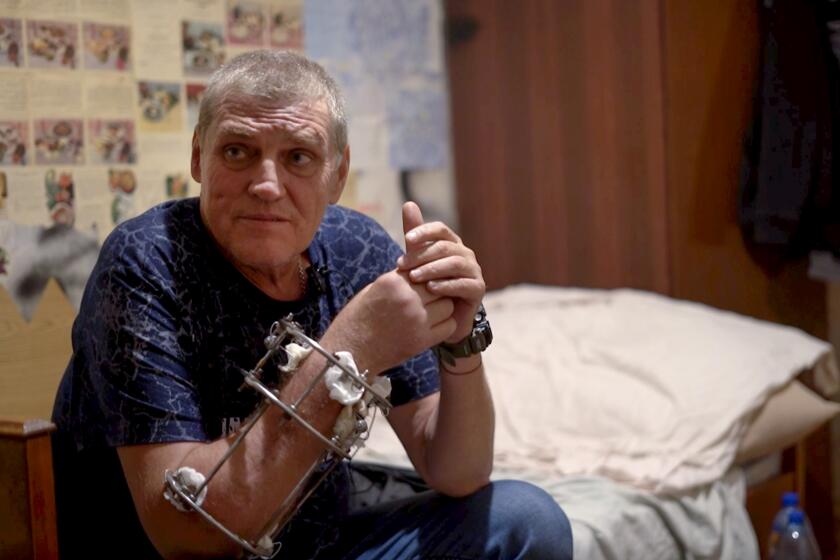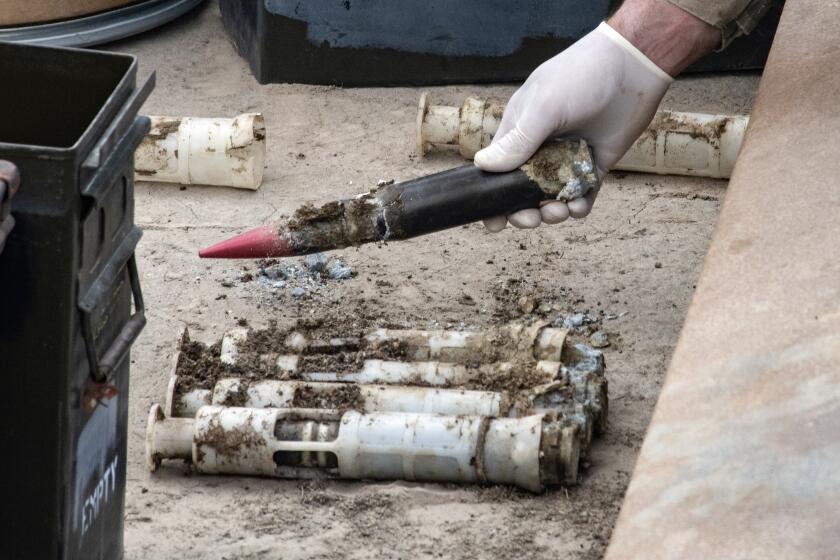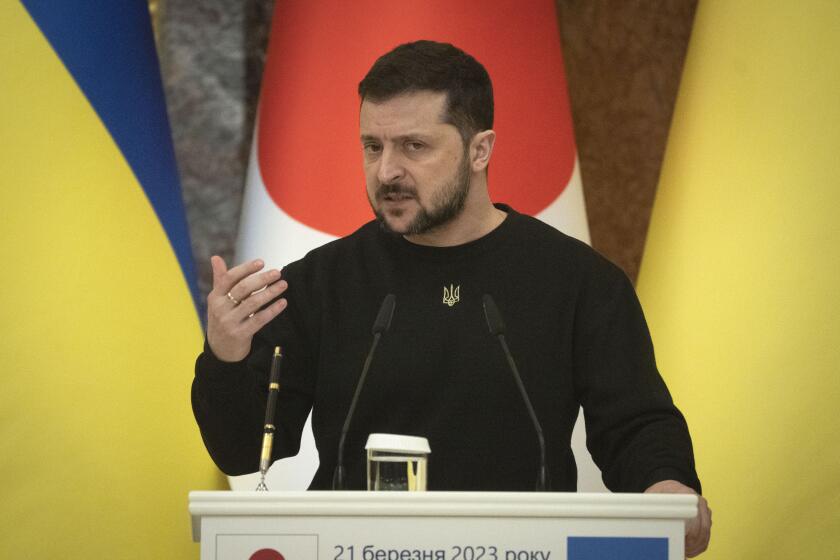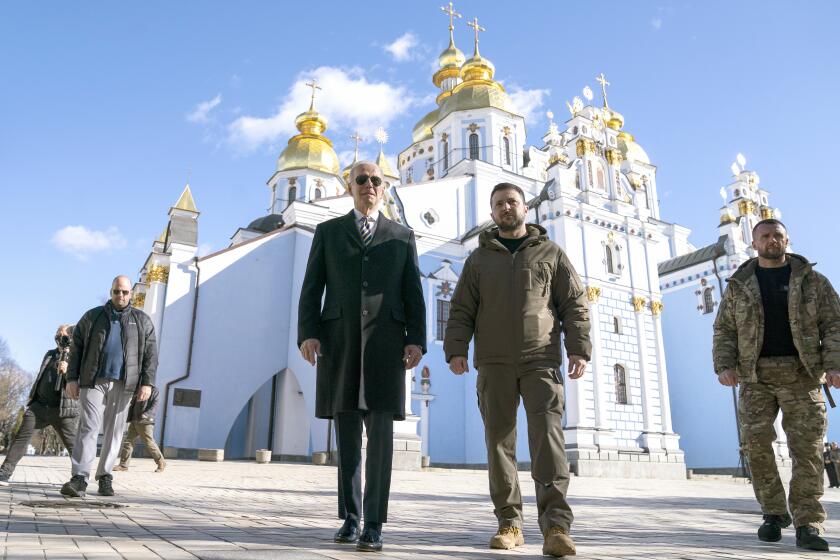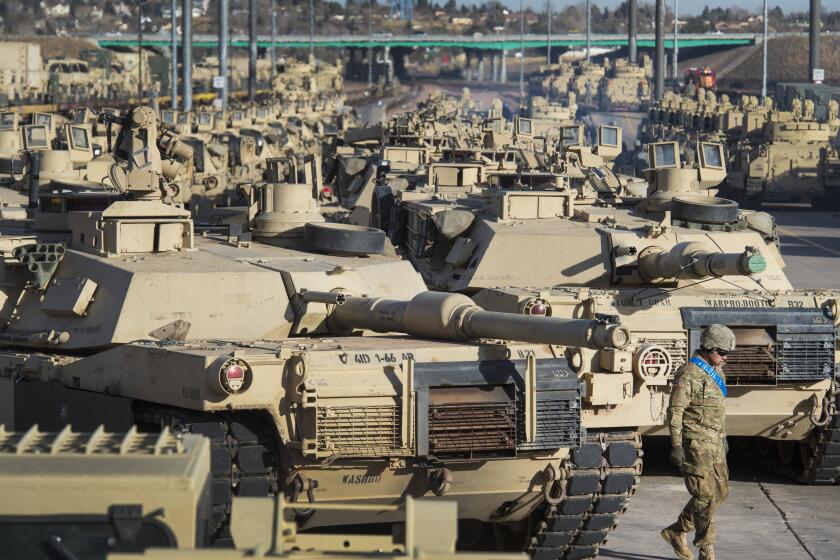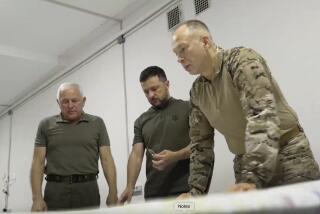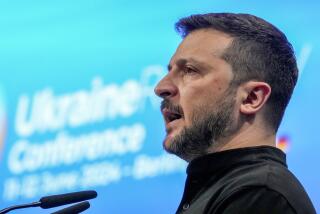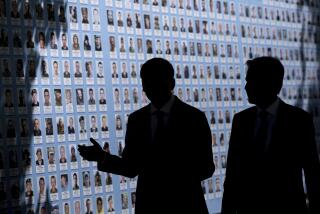Zelensky meets with U.N. atomic agency chief over Zaporizhzhia nuclear plant fears
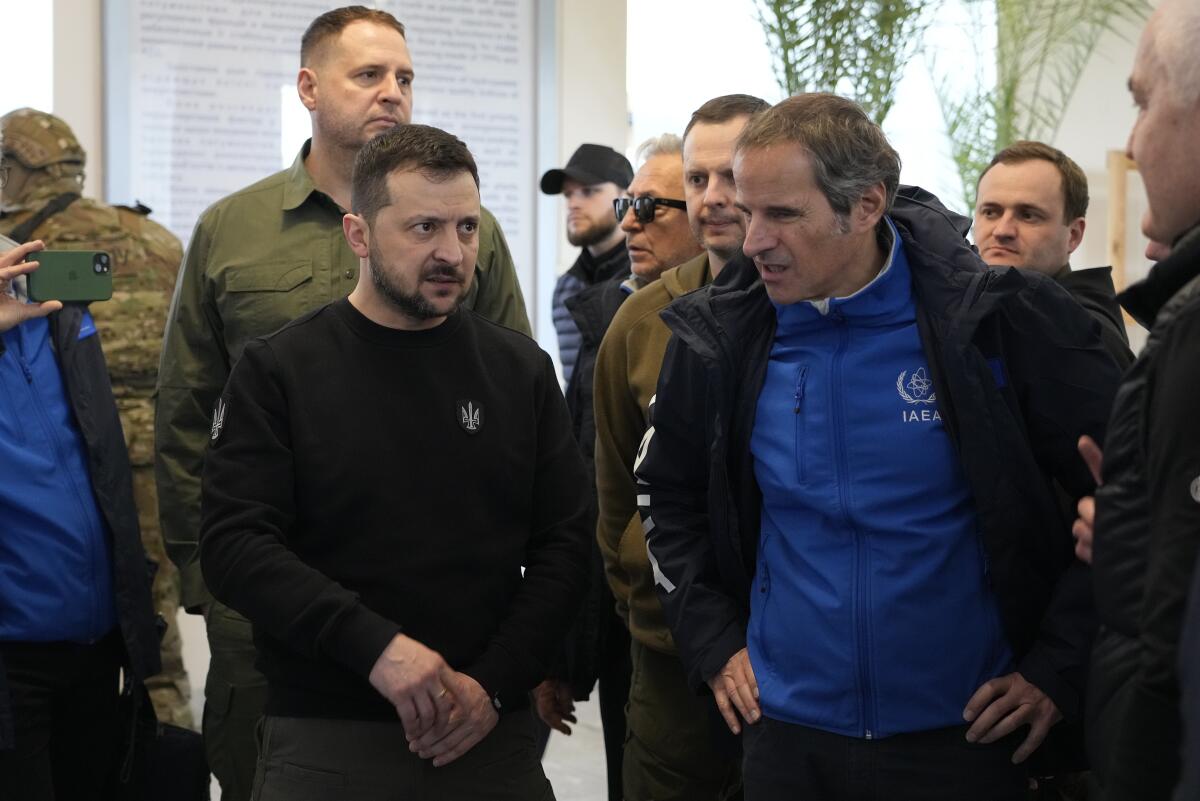
- Share via
ZAPORIZHZHIA, Ukraine — The United Nations’ atomic energy chief warned Ukrainian President Volodymyr Zelensky in a meeting Monday that the perilous situation at the Zaporizhzhia nuclear plant, Europe’s largest, “isn’t getting any better” as relentless fighting in the area puts the facility at risk of a nuclear disaster.
The Zaporizhzhia nuclear power plant’s six reactors are in shutdown, and it is receiving the electricity it needs to prevent a reactor meltdown through just one remaining power line. It has on occasion had to switch to emergency diesel generators to power its essential cooling systems.
In a meeting with Zelensky in southern Ukraine covered exclusively by the Associated Press, International Atomic Energy Agency Director-General Rafael Mariano Grossi said the situation at the plant remains tense because of the heavy military presence around it and a blackout that recently struck the facility, something that has occurred repeatedly since Russian forces took it over last year.
Grossi plans to visit the plant this week for the second time following Russia’s invasion 13 months ago. The Vienna-based agency has staff permanently deployed at the plant since Grossi’s last visit in September.
Earlier this month, fighting interrupted power supply to the plant for half a day, forcing staff to activate backup generators.
Workers at the Zaporizhzhia nuclear power plant are recounting fears of being abducted and tortured or killed by Russian forces who seized control of the facility and the city of Enerhodar.
Grossi expressed alarm at that development. “Each time we are rolling a dice,” he told his agency at the time. “And if we allow this to continue time after time, then one day our luck will run out.”
Grossi and Zelensky met in the city of Zaporizhzhia, which is in Ukrainian-held territory, about 30 miles northeast of the nuclear plant with the same name.
The IAEA announced in January that it was placing teams of experts at all four of Ukraine’s nuclear power plants to reduce the risk of accidents, including the now-closed Chernobyl plant whose deadly nuclear accident in 1986 spread fallout over much of Europe.
Russia has issued a sharp warning that the West risks further escalation after the U.K. said it would supply Ukraine with uranium-based ammunition.
Grossi emphasized that his seventh trip to Ukraine underlined his commitment and support for “as long as it takes.” Also attending the meeting were other IAEA officials; Andriy Yermak, the head of Zelensky’s office; and Petro Kotin, the head of Ukrainian nuclear operator Energoatom.
While in Zaporizhzhia, Zelensky also inspected military positions in the partially occupied province and awarded soldiers with military honors. He visited wounded soldiers at a hospital as well as an apartment building that Kyiv says was hit by Russian forces Wednesday, killing at least one person and injuring more than 30.
Residents were still shocked by the experience.
“It’s terrifying. I cannot find the words to tell you,” said Hanna Budkova, 39, who was at a busy playground in front of the apartment block with her nearly 2-year-old daughter. “I’m afraid to go anywhere near the windows.”
Zelensky later visited Nikopol, a frequently shelled city across the Dnieper River from the nuclear power plant, according to the presidential office.
The International Monetary Fund and Ukraine agree on new loans to support Kyiv’s finances, which are under severe strain from Russia’s invasion.
Elsewhere, two people were killed and 29 wounded Monday when Russian forces shelled the Ukrainian city of Sloviansk, in the partially occupied eastern Donetsk region, local officials said.
Video of the aftermath showed damaged residential buildings, debris in the streets and vehicles on fire. Zelensky described the attack as “terrorism.”
Russia has denied targeting residential areas even though artillery and rocket strikes have hit Ukrainian apartment buildings and civilian infrastructure daily during the war.
The Sloviansk attack followed a typical pattern of long-range shelling adopted by the Kremlin’s forces, especially in recent months as the fighting became deadlocked during the bitterly cold winter.
Start your day right
Sign up for Essential California for the L.A. Times biggest news, features and recommendations in your inbox six days a week.
You may occasionally receive promotional content from the Los Angeles Times.
In the Donetsk region, some 10 cities and villages were shelled by Russian forces over the previous 24 hours, Zelensky’s office reported Monday.
On Monday morning, Russian missiles hit the city of Avdiivka, damaging residential buildings, a hotel and a courthouse, it said.
Avdiivka Mayor Vitali Barabash said utility companies were being evacuated from the front-line city, as it “resembles more and more a landscape from post-apocalyptic movies.”
Attacks also intensified in the partially occupied southeastern Zaporizhzhia region, where 14 settlements on the front line were shelled, authorities said.
Democrats used to favor nonintervention and Republicans were hawks. Now, not so much. Will the role reversal last?
In the partially occupied Kherson region, the Ukrainian-controlled part of the province was shelled 20 times by the Russian artillery and aviation, wounding four people, the presidential office said.
Several explosions shook the Russia-occupied city of Melitopol in the Zaporizhzhia region, damaging a building where Russian security forces are quartered, said the exiled elected mayor Ivan Fyodorov.
The Russian-installed authorities said “artillery shelling” of Melitopol partially destroyed a vocational school building, damaged several other buildings and wounded four people.
U.S. officials say the Pentagon is quickening delivery of Abrams tanks to Ukraine, opting to send a refurbished older model that can be ready faster.
Earlier, Zelensky met in Kyiv with British actor Orlando Bloom, the head of Zelensky’s office, Yermak, said Monday.
Bloom, who is also a UNICEF goodwill ambassador, arrived in the Ukrainian capital over the weekend and visited its suburb of Irpin.
During his meeting with Zelensky, Bloom said “he was struck by the courage and resilience of Ukrainians, who despite the war remain strong,” Yermak wrote.
Bloom “will support projects to provide humanitarian assistance and restore infrastructure, focused on ensuring the interests of Ukrainian children,” the official said.
German Chancellor Olaf Scholz said Monday at a meeting in the Netherlands that Germany has fulfilled its promised delivery of 18 advanced Leopard 2 battle tanks to Ukraine. Canada, Norway and Poland also have sent such tanks to Ukraine.
More to Read
Sign up for Essential California
The most important California stories and recommendations in your inbox every morning.
You may occasionally receive promotional content from the Los Angeles Times.
